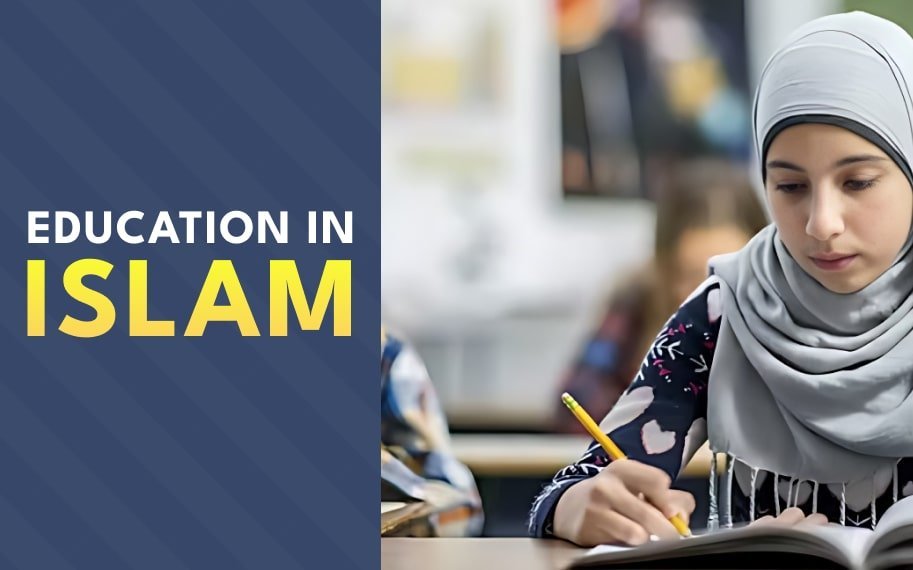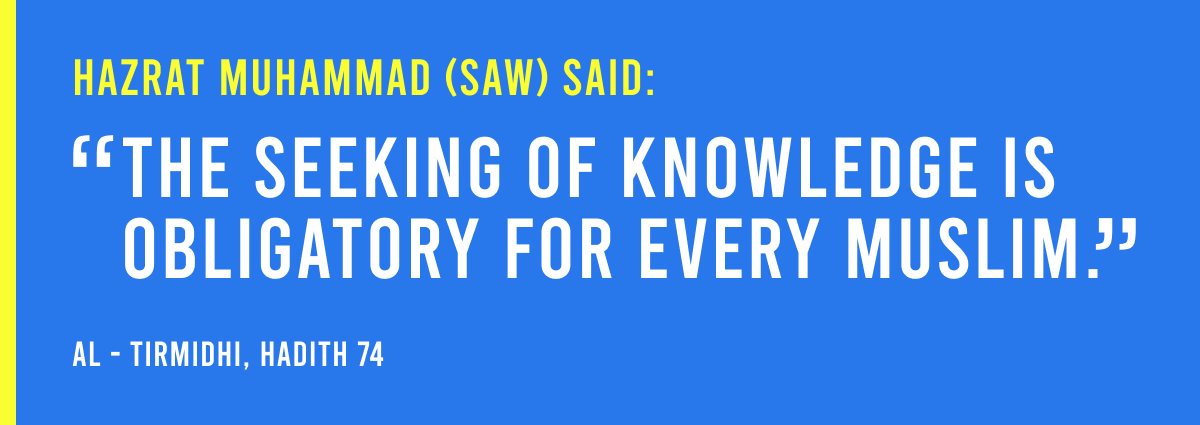
Education holds a revered position in Islam as a beacon of enlightenment and a cornerstone for personal, societal, and spiritual growth. Rooted in the teachings of the Quran and the practices of Prophet Muhammad, the significance of education in Islam transcends mere learning—it encompasses a holistic approach to knowledge, encompassing worldly and spiritual domains.
Table of Contents
The Quranic Embrace of Knowledge
The Quran, Islam’s holy book, emphasizes the pursuit of knowledge as a fundamental duty incumbent upon all Muslims. The first revelation to Prophet Muhammad was the command to read, signifying the paramount importance of seeking knowledge. “Read! In the name of your Lord who created.” (Quran, Surah Al-Alaq, 96:1)
Prophet Muhammad as the Paragon of Education
Prophet Muhammad is revered not only as the final messenger of Islam but also as a paragon of education. His teachings emphasized the sanctity of knowledge, inspiring his companions to seek wisdom, enlightenment, and understanding. His famous saying, “Seek knowledge from the cradle to the grave,” underscores the lifelong pursuit of learning.
Islamic Educational Institutions
Throughout Islamic history, a rich tradition of educational institutions emerged, known as madrasas and kuttab. These institutions served as centers for learning, teaching various subjects including Quranic studies, law, mathematics, astronomy, medicine, and philosophy.
Emphasis on Science and Innovation
Islam encourages the exploration of the natural world and its phenomena. Many early Muslim scholars significantly contributed to various fields, including mathematics, medicine, astronomy, and philosophy. They preserved and expanded upon ancient knowledge and laid the groundwork for numerous scientific advancements.
Education for Social and Moral Development
In Islam, education is not solely about academic learning but also encompasses moral and ethical development. The teachings of Islam stress the importance of cultivating virtues such as compassion, justice, empathy, and humility alongside academic pursuits.
Women’s Education in Islam
Education holds significant importance in Islam, not only for men but also for women.
- Quranic Emphasis: The Quran encourages seeking knowledge for both men and women, highlighting its importance for spiritual growth and societal advancement.
- Prophet Muhammad’s Advocacy: The Prophet Muhammad championed women’s education, supporting their right to seek knowledge and encouraging their participation in various subjects.
- Historical Female Scholars: Throughout Islamic history, women scholars played significant roles in education. Examples like Fatima al-Fihri founding the University of Al Quaraouiyine demonstrate women’s contributions to education.
- Equal Access: Islam promotes equal access to education, emphasizing that knowledge acquisition is not limited by gender and is essential for societal progress.
- Role in Educational Institutions: Women had prominent roles in teaching, scholarship, and the transmission of knowledge in various periods of Islamic history.
- Contemporary Progress: Many Muslim-majority countries have made strides in providing better educational opportunities for women, leading to increased literacy rates and broader participation in various fields.
- Challenges Remain: Despite progress, challenges exist due to cultural, social, and economic factors, limiting women’s access to education in some regions.
- Global Initiatives: Numerous initiatives strive to overcome these challenges and ensure better educational opportunities for women, aligning with the teachings of Islam that encourage knowledge-seeking for all.
In Islam, women’s education is a fundamental right, reflecting the belief that knowledge acquisition is vital for personal growth, societal development, and the betterment of communities.
Modern Perspectives on Education in Islam
In contemporary times, Muslims continue to emphasize education as a means of empowerment, progress, and societal development. Educational institutions across the Islamic world blend traditional teachings with modern disciplines to equip individuals with skills relevant to today’s global landscape.

Why is Education important?
Education holds immense significance for several reasons:
- Empowerment: Education empowers individuals by providing knowledge, skills, and critical thinking abilities, enabling them to make informed decisions and take control of their lives.
- Societal Progress: Educated societies tend to experience economic growth and social development. Education equips individuals to contribute positively to their communities, fostering innovation, productivity, and progress.
- Reduced Inequality: Education is a catalyst for reducing inequality. It offers opportunities for marginalized groups, bridging gaps and promoting social inclusion.
- Personal Growth: Education fosters personal growth and fulfillment. It expands horizons, broadens perspectives, and encourages continuous learning, leading to self-improvement and a deeper understanding of the world.
- Health and Well-being: Education is linked to better health outcomes. It raises awareness about health issues, promotes healthy behaviors, and facilitates access to healthcare services.
- Global Understanding: Education promotes tolerance, cultural understanding, and global cooperation. It nurtures respect for diversity and helps in building a more peaceful and interconnected world.
- Economic Stability: Educated individuals are better equipped to secure employment, earn higher incomes, and contribute to economic stability and growth.
- Critical Thinking and Problem Solving: Education develops critical thinking skills, enabling individuals to analyze situations, solve problems, and adapt to changing circumstances effectively.
Overall, education is a fundamental human right and a powerful tool for personal development, societal advancement, and the betterment of humanity.
Conclusion
Education in Islam embodies a holistic pursuit, encompassing intellectual, spiritual, and moral dimensions. It serves as a transformative force, empowering individuals to contribute positively to society while upholding the principles of Islam. Embracing the teachings of the Quran and the exemplary life of Prophet Muhammad, education in Islam remains a guiding light, illuminating paths and inspiring minds toward enlightenment and progress.
FAQs
1. What is the importance of education in Islam?
Education holds significant importance in Islam as it is considered a fundamental right for both men and women. Seeking knowledge is encouraged as a means of personal growth, spiritual development, and societal progress.
2. What role does the Quran play in education in Islam?
The Quran emphasizes the importance of seeking knowledge. It is considered the ultimate source of guidance and knowledge for Muslims, encouraging them to learn, reflect, and apply its teachings in various aspects of life.
3. Did Prophet Muhammad emphasize education?
Yes, Prophet Muhammad highly valued education and encouraged his followers, both men and women, to seek knowledge. He emphasized the pursuit of knowledge throughout one’s life and considered it a noble endeavor.
4. Are there any specific teachings about women’s education in Islam?
Yes, Islam advocates for women’s education. Women are encouraged to seek knowledge, and there are historical examples of female scholars and educators who played significant roles in Islamic history.
5. What subjects were taught in historical Islamic educational institutions?
Islamic educational institutions, known as madrasas and kuttab, taught various subjects including Quranic studies, Islamic law, Arabic language, mathematics, astronomy, medicine, and philosophy.
6. How does Islam view the education of both genders?
Islam advocates for equal access to education for both men and women. Education is seen as essential for the development of individuals and society, irrespective of gender.
7. What is the role of education in contemporary Islamic societies?
In modern times, education remains highly valued in Islamic societies. Many Muslim-majority countries focus on improving educational systems and ensuring broader access to education for all, including women and marginalized groups.
8. Does Islam encourage lifelong learning?
Yes, Islam encourages lifelong learning. The pursuit of knowledge is considered an ongoing journey, and Muslims are encouraged to seek knowledge throughout their lives.
9. How does education align with Islamic teachings on social justice and equality?
Education is viewed as a tool for promoting social justice and equality in Islam. It helps in empowering individuals, reducing inequality, and fostering a more equitable society.
10. Are there specific practices or rituals related to education in Islam?
While there are no specific rituals, education itself is seen as a form of worship in Islam. Seeking knowledge, teaching, and imparting knowledge to others are considered virtuous acts.
Read Also
Splitting of the Moon – A Divine Miracle
Do Muslims Celebrate Christmas?
Signs of the Day of Judgment (Qiyamah)
How to Be a Successful Husband – 20 Tips

